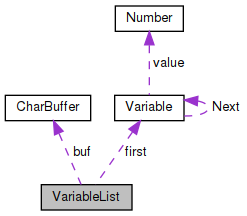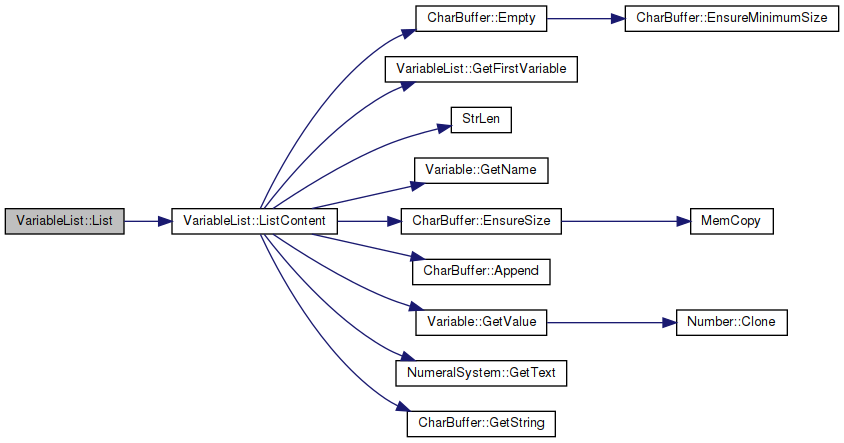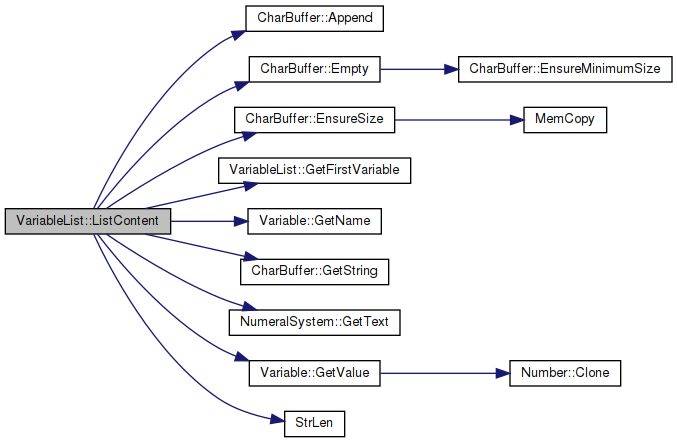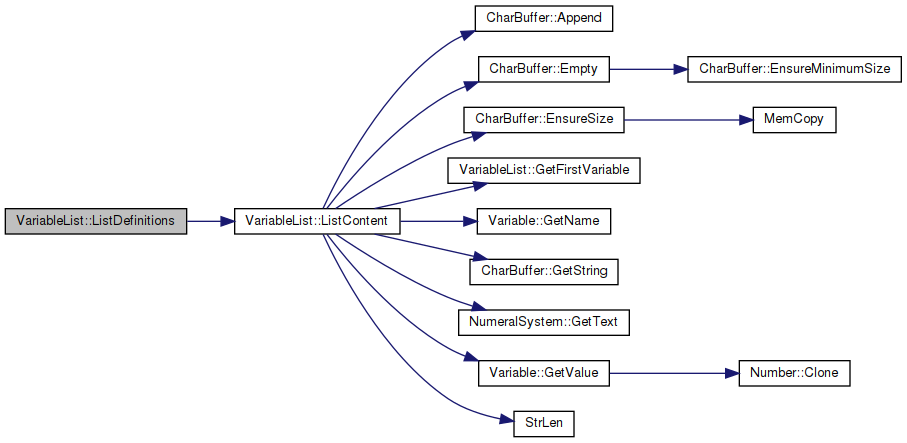A list of user defined variables. More...
#include <values.h>

Public Member Functions | |
| VariableList () | |
| ~VariableList () | |
| void | Clear () |
| bool | Delete (const char *name) |
| Variable * | GetFirstVariable () const |
| Variable * | GetVariable (const char *name) const |
| Variable * | CreateVariable (const char *name) |
| Variable * | InsertTemporaryVariable (Variable *variable) |
| void | RemoveTemporaryVariable () |
| char * | List () const |
| char * | ListDefinitions () const |
Private Member Functions | |
| char * | ListContent (bool cmdFormat) const |
Private Attributes | |
| CharBuffer * | buf |
| Variable * | first |
Detailed Description
Constructor & Destructor Documentation
◆ VariableList()
| VariableList::VariableList | ( | ) |
Definition at line 93 of file values.cpp.
References buf, CharBuffer::CharBuffer(), and first.
Referenced by Program::Program().


◆ ~VariableList()
| VariableList::~VariableList | ( | ) |
Definition at line 99 of file values.cpp.
Member Function Documentation
◆ Clear()
| void VariableList::Clear | ( | ) |
Definition at line 109 of file values.cpp.
References buf, CharBuffer::ClearBuffer(), and first.
Referenced by DeleteStatement::Execute().


◆ CreateVariable()
| Variable * VariableList::CreateVariable | ( | const char * | name | ) |
Definition at line 172 of file values.cpp.
References first, Variable::GetName(), Variable::Next, StrIsEqual(), and Variable::Variable().
Referenced by Parser::ParseIdent().


◆ Delete()
| bool VariableList::Delete | ( | const char * | name | ) |
Definition at line 120 of file values.cpp.
References Variable::chainDelete, first, GetVariable(), and Variable::Next.

◆ GetFirstVariable()
| Variable * VariableList::GetFirstVariable | ( | ) | const |
Definition at line 155 of file values.cpp.
References first.
Referenced by ListContent().

◆ GetVariable()
| Variable * VariableList::GetVariable | ( | const char * | name | ) | const |
Definition at line 160 of file values.cpp.
References first, Variable::GetName(), Variable::Next, and StrIsEqual().
Referenced by Delete(), and Parser::ParseIdent().


◆ InsertTemporaryVariable()
Definition at line 200 of file values.cpp.
References first, and Variable::Next.
Referenced by Parser::ParseFunctionDef().

◆ List()
| char * VariableList::List | ( | ) | const |
Definition at line 218 of file values.cpp.
References ListContent().
Referenced by ListVariablesStatement::Execute().


◆ ListContent()
|
private |
Definition at line 228 of file values.cpp.
References CharBuffer::Append(), buf, CharBuffer::Empty(), CharBuffer::EnsureSize(), GetFirstVariable(), Variable::GetName(), CharBuffer::GetString(), NumeralSystem::GetText(), Variable::GetValue(), Variable::Next, Program::Output, and StrLen().
Referenced by List(), and ListDefinitions().


◆ ListDefinitions()
| char * VariableList::ListDefinitions | ( | ) | const |
Definition at line 223 of file values.cpp.
References ListContent().
Referenced by SaveStatement::Execute().


◆ RemoveTemporaryVariable()
| void VariableList::RemoveTemporaryVariable | ( | ) |
Definition at line 210 of file values.cpp.
References first, and Variable::Next.
Referenced by Parser::ParseFunctionDef().

Member Data Documentation
◆ buf
|
private |
Definition at line 68 of file values.h.
Referenced by Clear(), ListContent(), VariableList(), and ~VariableList().
◆ first
|
private |
Definition at line 69 of file values.h.
Referenced by Clear(), CreateVariable(), Delete(), GetFirstVariable(), GetVariable(), InsertTemporaryVariable(), RemoveTemporaryVariable(), VariableList(), and ~VariableList().
The documentation for this class was generated from the following files:
- src/main/values.h
- src/main/values.cpp
